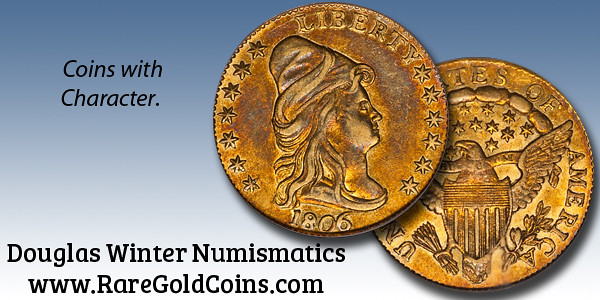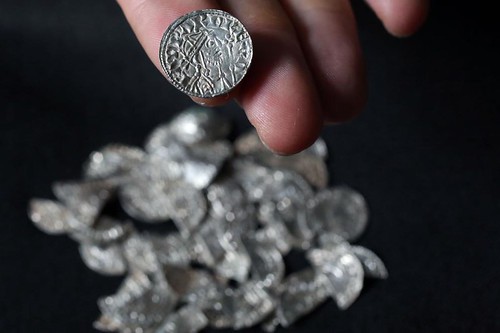
PREV ARTICLE
NEXT ARTICLE
FULL ISSUE
PREV FULL ISSUE
LARGE HOARD OF NORMAN SILVER PENNIES FOUNDDavid Sundman shared this article from The Sunday Times about a great new find of Norman coinage. Thanks. He writes: "This is a very exciting find! This should enliven collecting of early English hammered coins." -Editor
In 16 years of metal detecting together, Lisa Grace, 42, and Adam Staples, 43, from Derby, had found a number of precious items. Now they have discovered a vast collection of Norman treasure. The hoard of 2,528 coins has been described as "massively important" by experts at the British Museum, who said that it shed light on the transition between Anglo-Saxon and Norman rule and also revealed a 1,000-year-old form of tax evasion. While teaching five friends how to use their new metal detectors, the couple found the silver pennies in a field near Chew Valley. About 1,200 of them bear the image of Harold II, the last crowned Anglo-Saxon king of England, and 1,300 bear that of William the Conqueror, who defeated him at the Battle of Hastings in 1066. The museum said: "It is the largest Norman hoard found since 1833 and the largest ever found from the immediate aftermath of the Norman Conquest." It shows that coins bearing Harold's image were still in use in the months after the conquest and that the Normans struggled with the Old English spelling of moneyers' names and local mints included on the coins. The find has trebled the number of Harold II coins known to exist and increased sixfold the number of early William I coins. The value of the coins in the 1060s would have equalled the annual income of a whole estate, enough to buy 500 sheep. It was likely to have been buried for safe keeping by a landowner during the unrest that followed the conquest, possibly during the invasion of the region by Harold's sons in 1068. Some of the coins were cut in half to get a smaller denomination, while conservators found the first example of a "mule" coin combining elements of Harold and William's coinage. Gareth Williams, curator of early medieval coinage at the British Museum, described this as "an early form of tax-dodging". The hoard shows that one moneyer had worn out one of his William I dies, so used an old Harold II die, creating a coin with Harold's face on one side and William's inscription on the reverse. One coin combines dies from the reigns of William I and Edward the Confessor, Harold's predecessor. Those caught doing this risked losing a hand, but portraits of medieval kings were so stylised that they looked very similar. They reported the find to the local coroner, as required by law, and it was taken to the museum. If the coroner rules, as is likely, that the find is "treasure", the Treasure Act states that a museum can acquire the hoard and offer a reward to the finders. Any proceeds will be split 50-50 between the landowner and detectorist group. Mr Staples said the couple would use their share to buy a home. The British Museum said the Roman Baths and Pump Room in Bath wanted the coins. To read the complete article, see:
Arthur Shippee passed along this BBC News news story and video. Thanks. -Editor To read the complete article, see:
To watch the complete video, see:

Wayne Homren, Editor The Numismatic Bibliomania Society is a non-profit organization promoting numismatic literature. See our web site at coinbooks.org. To submit items for publication in The E-Sylum, write to the Editor at this address: whomren@gmail.com To subscribe go to: https://my.binhost.com/lists/listinfo/esylum All Rights Reserved. NBS Home Page Contact the NBS webmaster 
|
